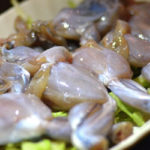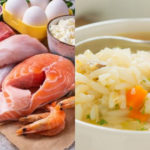Raising a young child is the most delicate phase, especially when the child is weak. Many parents use methods like boiling vegetables, meat and bones to extract the nutrients and feed it to their child. Some believe that by boiling thoroughly, the nutrients are transferred into the water, making it easier for the child to consume. This water can also be used to cook porridge for the child.
However, according to nutrition experts, boiled water doesn’t contain many nutrients. The water from boiling bones and meat may have aroma and sweetness, and the longer it is boiled, the more nitrogen it contains, stimulating the taste buds. But the proteins and calcium are still primarily found in the meat and bones. As for boiled water from vegetables, only a small amount of water-soluble vitamins like Vitamin C and Vitamin B1 are present, while the main nutrients are still in the food. Moreover, if meat, bones, and vegetables are boiled for too long, they can have a negative impact on a child’s health as prolonged cooking produces harmful nitrites.

In the early years, a child’s weight develops rapidly, so it is essential to provide a balanced diet. Therefore, using broth or stewed food for a child can result in nutritional deficiencies and imbalance.
That is why parents should give both solids and liquids to their children. Solids should be minced or ground to help the child learn how to eat. All the necessary nutrients such as protein, fat, calcium, phosphorus, iron, zinc, etc. (which build the cell structure of the body’s organs and participate in various bodily functions) are found in the solid part of the food.

Tips for introducing solid foods to children
Gradually introduce chewing based on the child’s age, avoiding the habit of prolonged grinding that prevents the child from chewing properly. Chewing stimulates the production of saliva, aiding digestion, increasing appetite, and developing jaw muscles.
Avoid adding sugar when cooking porridge for the child, as sugar is quickly absorbed and can make the child feel full without providing long-term benefits for their development.

Avoid solely using cooking oil for the child and include some fat. Young children require cholesterol for brain development, not like adults, so it is important not to completely replace fat with oil.
Young children do not require much salt, so children under the age of 1 should not be given additional salt. The amount of salt in food is sufficient for the child, so avoid adding extra salt such as the seasoning preferred by parents, especially if parents have a preference for salty taste, do not impose it on the child.
Avoid mixing flour with milk or adding milk to the porridge to think that the child will eat more. This method makes digestion difficult and burdensome for the child.
The early years are a critical period for optimal child development, so parents need to pay attention.
6 Mistakes in Parental Eating Habits to Avoid for Your Child’s Growth, Intelligence
In the development of children, nutrition plays a crucial role. If parents make these 6 mistakes, it will affect the height and weight of the child.


































